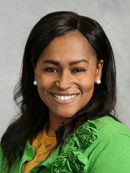Neuromuscular Fellowship
The goal of the University of North Carolina at Chapel Hill Neuromuscular Fellowship Program is to train fellows to care for patients with neuromuscular disorders and to gain expertise in electrodiagnostic medicine.
Graded and progressive responsibilities are developed as our fellows gain experience in the clinical management of patients with neuromuscular disorders and in the skills acquired in the EMG laboratory.
The objectives of the program will be achieved as the six ACGME core competencies in the areas of patient care, medical knowledge, practice-based learning and improvement, interpersonal and communication skills, professionalism, and systems-based practice are attained.
Program Description
The Neuromuscular Fellowship Program offers a unique setting for the fellows to become experienced in the evaluation and treatment of patients with neuromuscular disorders. This is facilitated through a large patient population within UNC Health serving the Research Triangle area, the state of North Carolina and the states surrounding North Carolina and. Teaching comes from faculty with expertise in all aspects of neuromuscular medicine.
At the end of the fellowship, trainees will be able to evaluate, diagnose and treat patients with a wide variety of neuromuscular disorders, and they will develop skills to perform both routine and advanced electrodiagnostic testing. Trainees completing the fellowship will qualify to take the neuromuscular medicine ABPN board as well as the ABEM electrodiagnostic board exams.
Neuromuscular DivisionThank you for your interest in our program. We will be processing applications and distributing offers through the AANEM portal. Please utilize this portal to send application materials. Required application materials include CV, personal statement and letters of recommendation.
Requirements
The Neuromuscular Medicine fellows must have successfully completed a residency program in Neurology or Physiatry accredited by the ACGME.
Outpatient Neuromuscular Clinics
Fellows will spend four to five half days per week in the outpatient neuromuscular clinics with neuromuscular medicine faculty. The fellow will see patients referred for general neuromuscular evaluation, as well as patients in specific subspecialty clinics, including those dedicated to muscular dystrophy association (MDA), peripheral neuropathy, myasthenia gravis, and amyotrophic lateral sclerosis (ALS).
EMG Laboratory
The fellows will spend four to five half days per week in the EMG laboratory learning electrodiagnostic techniques under the supervision of neuromuscular and physiatry faculty. The fellows will learn routine EMG and NCS for evaluation of common and complex neuromuscular disorders. There is also training in use of neuromuscular ultrasound in the assessment of neuromuscular disorders.
Specialized Training
In addition to training in standard electrodiagnostic techniques, the fellows will have the opportunity to have exposure and experience with advanced techniques such as single fiber EMG, quantitative motor unit analysis, and chemodenervation. There is exposure to, and opportunity for training in autonomic testing. The fellows will learn skin biopsy techniques in the evaluation of small fiber neuropathy.
Lectures
A formal didactic education program covering neuromuscular medicine and electrodiagnostic medicine topics includes:
- Neuromuscular medicine didactic lectures series
- Neuromuscular pathology conference
- Neuromuscular case conference
- EMG case conference
- Journal Club
The fellows will be trained in the basic principles of research including how research is conducted, evaluated, explained to patients and applied to patient care.
The fellows will be expected to participate in scholarly activity. In addition to being able to participate in resident and medical student teaching, the fellows will be trained on how to review and write a scientific paper.
The fellows will be encouraged to contribute to the scientific community by writing case reports, case series and if interested, designing a research study.
UNC allocates adequate educational resources to facilitate trainees’ involvement in scholarly activities and attend scientific conferences.
Mailing Address
Department of Neurology at UNC-Chapel Hill
CC: Rebecca Traub, MD
Program Director, Neuromuscular Fellowship
Physicians Office Building
170 Manning Drive, CB#7025
Chapel Hill, NC 27599-7025

